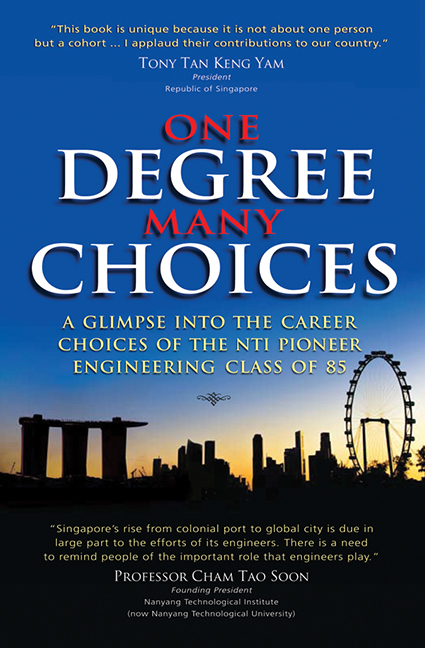 One Degree, Many Choices
One Degree, Many Choices from PART II - ENGINEERING PURSUITS
Published online by Cambridge University Press: 21 October 2015
“What I learned at NTI was relevant and of international standard.”
— Chua Thian Yee, EEE PioneerWATCHING THE CLOSURE of National Semiconductor's Singapore plant in 2006 was memorable for Gary Chan. “It was an invaluable experience as one of the last few men standing,” said Gary who was involved in the shut-down process from start to end. He had been with the company after it acquired his first employer Fairchild Semiconductor in 1987. National Semiconductor was a job lifeline to grateful NTI pioneers such as Ooi Kok Chan. He shared, “I did my industrial attachment at National Semiconductor and they offered me the post of a test engineer one month after graduation.”
Fairchild Semiconductor, an American firm, employed many NTI pioneers including Liu Fook Thim. In 1985, American semiconductor companies were trying to catch up with their Japanese competitors. The Japanese excelled in statistical process control techniques. “I was hired to implement this technique at Fairchild,” said Fook Thim who studied the subject at NTI. However, it was a challenge to get cooperation from production and maintenance staff. Things changed only after the top issued a directive.
Many NTI pioneers started their careers in this industry, a stepping stone for some NTI pioneers to greater things. R. Sinnakaruppan and Inderjit Singh were working for National Semiconductors and Texas Instrument respectively before entering politics.
The semiconductor industry is an important component of Singapore's economy. All parts of the semiconductor value chain including research and development and manufacturing are here. In 2008, semiconductors formed 55 per cent of the country's total electronics manufacturing output of $68 billion. That was 11 per cent of the global semiconductor output.
In 1969, Singapore welcomed the first chip assembly and test plant set up by National Semiconductor. In the 1980s, other Silicon Valley semiconductor companies such as General Electric Intersil came and turned Singapore into a semiconductor packaging powerhouse. Charlie Foo Siang Sin spent the early part of his career with Intersil before moving to do electronics packaging at 3M's Woodlands factory. It produces flexible circuits used in mobile phones, disk drives and ink-jet printers.
To save this book to your Kindle, first ensure [email protected] is added to your Approved Personal Document E-mail List under your Personal Document Settings on the Manage Your Content and Devices page of your Amazon account. Then enter the ‘name’ part of your Kindle email address below. Find out more about saving to your Kindle.
Note you can select to save to either the @free.kindle.com or @kindle.com variations. ‘@free.kindle.com’ emails are free but can only be saved to your device when it is connected to wi-fi. ‘@kindle.com’ emails can be delivered even when you are not connected to wi-fi, but note that service fees apply.
Find out more about the Kindle Personal Document Service.
To save content items to your account, please confirm that you agree to abide by our usage policies. If this is the first time you use this feature, you will be asked to authorise Cambridge Core to connect with your account. Find out more about saving content to Dropbox.
To save content items to your account, please confirm that you agree to abide by our usage policies. If this is the first time you use this feature, you will be asked to authorise Cambridge Core to connect with your account. Find out more about saving content to Google Drive.